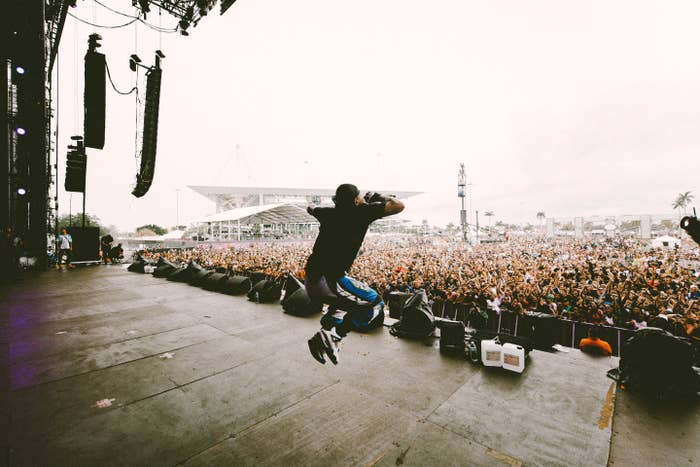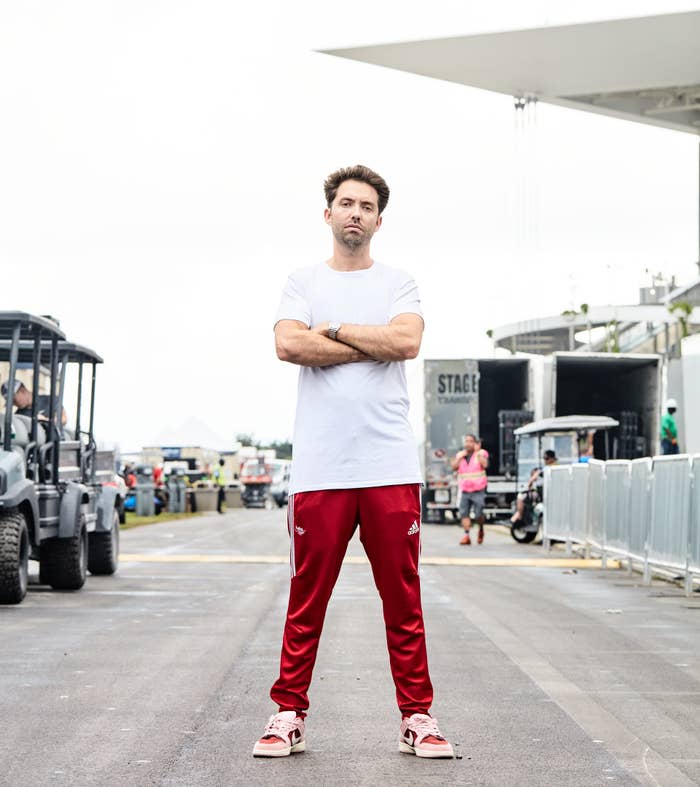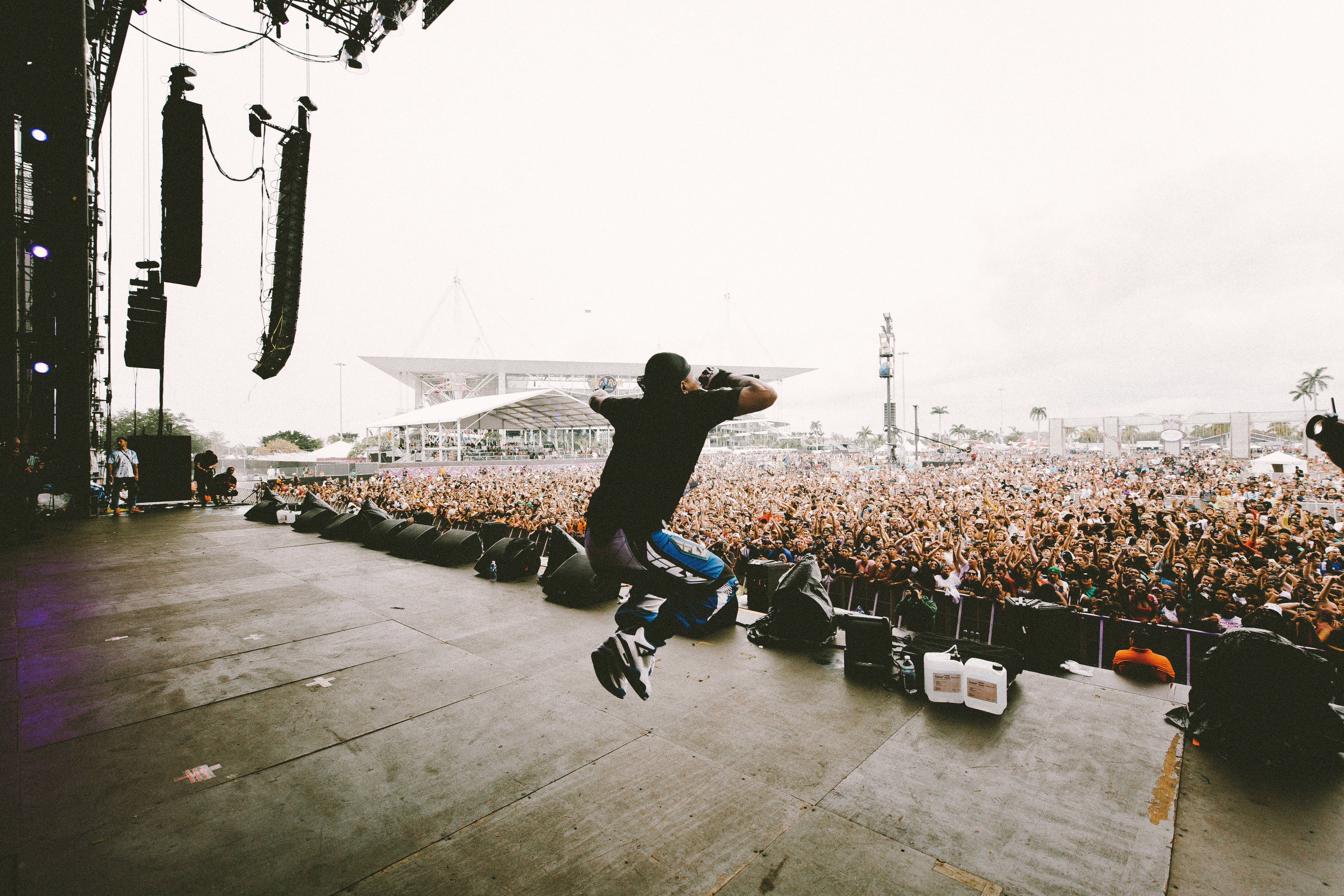
When the COVID-19 pandemic hit in early 2020, few expected the ripple effects it would ultimately have on everyday life. The virus was a major shock to our economy, businesses, and of course, families. The music industry, in particular, took a major hit. Live concerts and festivals were postponed or cancelled indefinitely, and some venues closed their doors forever. Though a handful of small shows took place in some areas of the country, major events like Coachella, Rolling Loud, and Lollapalooza shut down completely.
A year and half later, though, music festivals are finally coming back. Rolling Loud Miami was one of the first festivals to confirm its summer lineup, and it will be the first to take place. After initially planning to return in May, organizers pushed the timeline back this spring before settling on July 23 through July 25.
The demand for tickets was extremely high. Rolling Loud co-founder Tariq Cherif tells Complex that the Miami dates sold out in an hour and a half, with 75,000 people expected to show up per day. “We’ve never sold out that fast,” he says.
“They would’ve sold out even faster if we could have more people buy them at once,” Cherif explains. “We can only have 17,000 people at a time putting tickets in the cart. The waiting page, at any given moment, had 150,000 people in it.”
Of course, there are still some concerns regarding the pandemic, as new variants are on the rise. Rolling Loud has opted for a “choice model,” encouraging fans to get vaccinated, wear masks, and stay home if they feel sick. And Cherif notes that they are working with local authorities to ensure the safety of their guests.
Despite lingering concerns, the spirits among organizers and attendees are high, as everyone gets a chance to gather again for the first time in nearly two years. This year’s festival is headlined by Travis Scott, ASAP Rocky, and Post Malone. And according to a report in Billboard, Kanye West is expected to perform on Sunday.
“It’s just going to be incredible,” Cherif says. “I can’t imagine the smiles and the hugs and vibes that are going to be shared with everybody finally being together again at a scale like this. Rolling Loud is already like a massive reunion, but this time it’s going to be on another level.”
Ahead of Rolling Loud’s return in Miami, Tariq Cherif spoke with Complex about planning for the festival amidst the pandemic, coordinating with artists, and what fans can expect. The interview, lightly edited for clarity, is below.

How did you go about planning for this year’s Rolling Loud?
Honestly, it was a lot of sitting and waiting. It was a lot of unknown planning for different scenarios of how the world evolved and what the festival would be like—and when it could possibly be. It was a lot of drawing boards that didn’t result in anything because the goal post kept getting pushed back. But finally, we settled on a date and we’re very excited to be producing a show actively now.
What were some of the challenges you faced during the planning process?
I’d say the biggest challenge this year has been, believe it or not, the construction at the venue. You would think the biggest challenge would be COVID, the cliché answer. That was the biggest thing before we were actively producing a show. But once we got through that, it was about the venue. They have F[Formula] 1 going on there next year. F1 is doing construction and it’s a very big site. We’ve shifted and it’s all good, but dealing with them being there and doing construction and our footprint, that’s honestly been the biggest headache this year.
Once you got the go ahead to move forward with the festival in the midst of the COVID pandemic, how long did it take to get the construction together?
We’re still working on the details right now. As far as plans, it was a pretty quick decision because it was in April [2021]. We were holding out hope to do the show in May, but at the very last minute it was like, “Alright, we’re not doing May, stay tuned for new dates.” We had to decide whether to take the risk and do the show in the summer, or move to next year, or try to find a date in the fall. But finding a date in the fall involves working with the football schedule, which wasn’t out yet. It was like a shot in the dark, so we really just made the decision to take the chance doing the summer show. It was really just snapping our fingers, and here we go.
For us, we’ve been doing this. It’ll be our third year at that site. It’ll be the seventh year of the festival, but the sixth year was the COVID year. We know a thing or two about doing this and it didn’t take too long to get everything in motion. The show was already supposed to be produced in 2020, so a lot of the initial work was done, but a lot of the work had to be redone. It’s the same people, though. The team got right to it, and I’m very proud of them for doing that.
Other festivals have announced their lineups and dates, but there are still some organizers on the fence with new COVID variants coming out. What made you all feel confident in moving forward with the July schedule?
One of the major things was looking at the landscape and seeing a lot of major sporting events happening with large capacities, and that trend has continued. Yesterday, you had the Euro Cup in London, Italy vs. England, and I think that game had 75,000 people at it. When we made the decision, there were UFC fights and basketball games, and the Super Bowl happened and had a lot of fans. Everything was trending in the direction we wanted to see. Also, we’re seeing a lot of vaccinations and we feel that it’s gotten to the point where people feel comfortable coming to the show. They can make that choice, and that’s what people did.
Artists are shuffling their schedules right now due to COVID. Were there any challenges in managing the lineup?
It’s always a challenge booking the lineup, especially when we had a lineup booked for 2020, and then a handful of these artists are a lot bigger than they were then. So, it becomes a conversation of, are they getting more money? We tried to stay away from that. Or is their set time changing? Are they going later? Are they moving stages? Are they moving days? There was a little bit of that for sure. There always is, though.
Are there any concerns about new COVID restrictions coming up? And if so, how do you plan to deal with those unforeseen challenges related to the pandemic?
As a business owner and as a festival operator, you can’t prepare for unforeseen challenges. You just have to be prepared to act accordingly no matter what happens. You just have to use the information at hand and use the resources at your disposal and do what you have to do. Now, with that being said, we don’t anticipate any changes in our COVID plan, but if presented with anything, we’ll work with local authorities and do what we need to do.
“All pandemic, we’ve been at home, and people want to get back together. I’m going to cry. I don’t just do this because it’s my profession. I love bringing people together and having a good time, and I’ve done it since I was doing house parties.”
Are there any mandatory policies that you’re expecting of your attendees, like vaccinations or 72-hour testing prior to arrival?
We’ve gone with a choice model, where we encourage our fans to get vaccinated, we encourage our fans to wear masks, we encourage our fans to stay home should they not feel well. So ultimately, we’ve left the choice up to our fans.
What was the vision for partnering with the WWE for a live SmackDown this year? And how do you think your brand and the WWE align with each other?
A lot of people on this team grew up fans of wrestling, and we love and respect what the WWE has built as far as their storylines and their brand and the way they’ve gotten this massive legion of diehard fans. They go to WrestleMania every year, and we’re building something similar over here. Granted, it’s different, but we have a lot of similarities, and we also have a lot of crossover fans. There’s a lot of hip-hop fans that are fans of wrestling. There’s a lot of wrestling fans who are fans of hip-hop. Hip-hop dominates all culture.
It’s the No. 1 genre of music. It drives culture across all press points, from music to fashion to athletics to tech to charities. It doesn’t matter where you are, hip-hop has a major presence. So we have a lot of crossover fans thanks to hip-hop being so massive, and thanks to wrestling being so massive. We just thought it would be cool to mesh both worlds together and bring them into our world, expose them to our fans at the festival and on our stream. And we’ll be in turn exposed to their fans that tune into Fox on Friday night to watch SmackDown. It’ll be pretty cool.
How fast did the tickets for the Miami dates sell out?
They would’ve sold out even faster if we could have more people buy them at once, but it sold out in, like, an hour and a half or so. We can only have 17,000 people at a time putting tickets in the cart. Before that, we had a waiting page, and eventually they get pushed through to the actual shopping cart page. The waiting page, at any given moment, had 150,000 people in it. So there was a lot of demand.
How would you describe the demand for concerts again?
All I can tell is what happened with us. We never sold out that fast, and we went and sold out L.A. right after that. And our New York show is very close to being sold out. We’re a young festival. We’re not quite Coachella yet. Coachella is used to selling out right when they go on sale. But that was a new thing for us. So, it confirms that there’s a big demand. All pandemic, we’ve been at home, people want to get back together. I’m going to cry. I don’t just do this because it’s my profession. I love bringing people together and having a good time, and I’ve done it since I was doing house parties, since I was doing 50 person concerts, 100 person concerts, and everything up until these massive festivals. It comes from the same place. I enjoy entertaining people and having a good time.
Do you know the expected attendance for Miami in comparison to the previous years?
It’s right around the same amount, about 75,000 per day.
On the flyer, Bobby Shmurda’s name is shown as a “special guest.” Is there a particular reason for that mention?
We wanted to give him the respect of being highlighted. He’s going to come out, and he’s not going to have a very long set, but we just wanted to highlight that he’s come home and that this moment is going to happen. We just wanted to give him that respect.
There’s a handful of women on this year’s lineup, which is amazing. Considering the past feedback, was this a conscious decision or did it just happen naturally with the way that trends are happening in rap right now?
There was a time, five or so years ago, where the female presence in the rap game was not where it is today. It’s very strong and healthy now and getting stronger and healthier, and I appreciate and love it. But I have to admit, in 2015, 2016, and 2017, there was not a very strong female presence in the rap game, and that was reflected in our lineups, and we caught a lot of flak for it. Ever since then, we have made a conscious effort to book a solid amount of women, but also, I don’t want it to be framed like it’s a handout or trying to avoid this “cancel culture” mob. That’s not what it is. The truth is that the female presence in hip-hop has become much stronger and all we are is a mirror to rap. We just hold up the mirror and you’ll land on the lineup if you’re in the cultural zeitgeist of hip-hop right now. So that just so happens to be a lot of women right now, and I think it’s great.
Why do you think that Rolling Loud is so important to rap culture?
I think it’s because we’ve grown with the space. This isn’t a festival that got created after this modern landscape of hip-hop became what it is. Myself and my business partner Matt [Zingler] started booking rap concerts in 2010, and we built our base all the way through 2015, booking monthly hip-hop tours throughout the state of Florida, really getting to know the scene in Florida. From there, we started Rolling Loud in 2015, and only 6,500 people came. It was a one-day show, but we had a group of very cool, eclectic, cutting-edge, underground lineup: Schoolboy Q, Travis Scott, Action Bronson, Curren$y, Juicy J, Casey Veggies, Rob Banks, Denzel Curry. I’m missing some people like Awful Records, Two-9.
You could just check the flyer from 2015, but for that time, it was really cool. It kind of reflected where that new school generation of hip-hop, of the Currensy, Mac Miller, Wiz Khalifa era, Nipsey Hussle-type. That era of hip-hop, and the bridge to the underground and SoundCloud era of hip-hop, and the Travis Scott era. Then in 2016, we brought on Lil Uzi Vert and Playboi Carti and Lil Yachty, and 21 Savage. That show went up to 15,000 people, so as the scene was growing, we were growing. Then in 2017, we have our colossal show, and that’s the same year that hip-hop becomes the most popular genre of music in the world. We’ve grown with the genre, and we just try to be an accurate reflection of where the genre is currently, while at the same time honoring where it was and looking forward to where it’s going.
What does the ultimate vision for Rolling Loud look like over the next 6-10 years?
We really see ourselves just becoming more and more of a household name. Throughout the pandemic, we expanded a lot into our media department and did more content. We’re looking to keep upping our content game through different touchpoints of original content, documentary content, festival content, music, all types of stuff. Upping our merch game and then executing our shows even better and making the festival experience better and better year after year. We’ll probably keep the US shows at the same amount, and then we have some worldwide expansion coming: Europe, Asia, Australia, South America potentially. Everything is in discussion right now, so we’ll see where we land on the map. And we want to just stay true to the scene, more than anything, stay true to the culture.
How do you balance your manager duties, along with Rolling Loud?
This is not natural for me. I’m not a schedule dates type of person that wants to have calls scheduled. That’s not something that comes naturally to me, but I will learn to embrace that and really try to schedule my days out super efficiently. For an interview like this, I’ll never try to schedule it for shorter than 30 minutes, but best believe my calendar has plenty of 10 and 15-minute calls on it. I just try to cram it in there, and I manage my inbox like a to-do list. Granted, I do fall off the wagon sometimes, and sometimes my inbox will go crazy, but for the most part, I try to manage my inboxes and keep them at zero. When stuff comes up, I try to handle it or delegate it, and one hand kind of washes the other.
Opportunities come up for Rolling Loud because of the management stuff, because through the management game, I have a lot of relationship-based stuff. So, I’m hanging out with a lot of managers via my clients and artists at the same time. Also, opportunities come up for my artists via Rolling Loud, so one hand washes the other. I do try to keep things separate as much as I can because I believe in all my artists. They don’t need Rolling Loud; they can make it without it. I just love both of these things. Don’t get me wrong, though, it does get stressful sometimes when I’m heavy in both. Like, if Ski Mask [The Slump God] is super active, we just put out a mixtape, and Ski Mask is super active and I’m working on Rolling Loud. So that release week was very stressful for me, but we got through it.
Is there anything you can tease for Ski Mask at the festival?
He’s working on doing something very cool. If we can pull it off, it’ll be very cool. It’s just a cool thing he’ll do with the crowd. If we can pull it off, it’ll be legendary.
Rolling Loud always creates viral moments organically. Are there any more surprises that we can expect?
You can always just expect a lot of special guests. In the crowd, I know people are buying tables in our Loud club, which is our VIP bottle service area that has a view of the main stage. We have a bunch of celebrities buying tables in there, athletes too. We have a lot of artists on the guest list that are coming that are going to have artist passes. Who knows what stages they’ll end up at. It’s just going to be incredible. I can’t imagine the smiles and the hugs and vibes that are going to be shared with everybody finally being together again at a scale like this. Rolling Loud is already like a massive reunion, but this time it’s going to be on another level.
Is there anything else you want the people to know about Rolling Loud Miami or the other festivals coming up?
Just drink a lot of water, eat healthy food. If you’re coming to any of our festivals this year, please take your health seriously. Get a training regiment in. I really believe everybody should train three times a week. Even if you’re just walking around the neighborhood. I understand not everybody has access to the gym, just take a walk three times a week, 45 minutes. Drink a lot of water, try to eat healthy, and it’ll really help you have the best time at Rolling Loud. I’ve seen people get out of sorts, overheated, not hydrated enough, not ready to be standing that long. You’re putting yourself through three days of standing for seven hours a day, whatever it may be. Not to mention the walking from stage to stage, or jumping up and down to your favorite artists. It’ll take a toll on you after a while, so just make sure you’re training for it.

